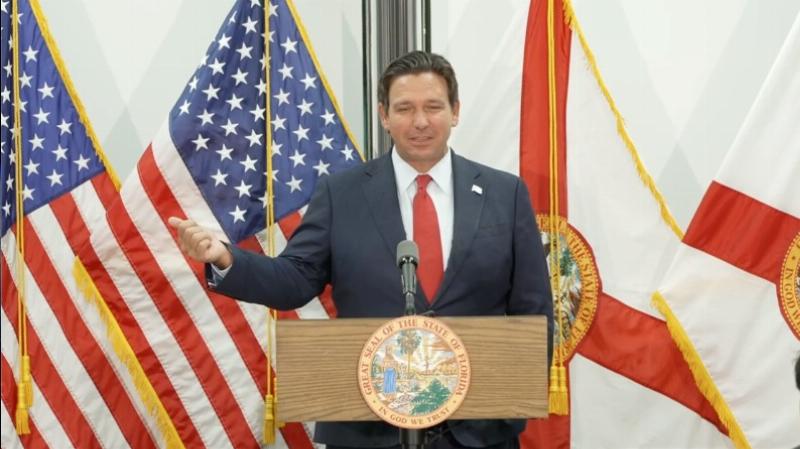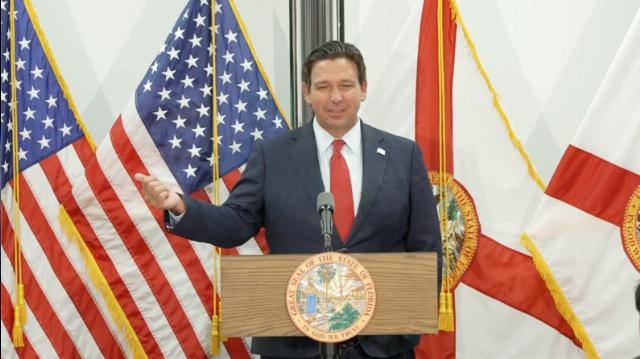


Ron DeSantis had no sooner installed a new CFO, Blaise Ingolia, into the Florida state government than he decided to crack down on the management of those municipalities and counties. Ingolia will be instituting a process similar to the federal Department of Government Efficiency (DOGE). Unofficially, Ingolia is calling it “FAFO,” or the Florida Agency for Fiscal Oversight. (It’s unclear whether that name will be permanent.)
The audit has already begun. The governor sent letters to Gainesville and Broward County requesting financial and DEI information and access to offices, data, and personnel:
“There is a new era of accountability in the state of Florida when it comes to fiscal spending,” CFO Ingoglia said.
“We have the authority. This is no longer optional. We don’t have to ask mother, may I? We can just simply say you must comply under the law,” DeSantis said.
The reviews will include onsite inspections, data system pull, and possibly daily fines for those cities and counties that refuse to comply.
“We need to start asking local government, where are you spending this money? And then let the people know what they’re spending the money on,” Ingoglia said. “Then let the people make the decision that this is worthwhile.”
The mayor of Gainesville, Harvey Ward, quickly promised full cooperation in this effort:
“Yesterday evening, I received a request from Florida DOGE. The city of Gainesville has been and remains an open book, and as mayor, I stand by the efficiency and resiliency of our city government. Over the past two years our city commission has passed a historic debt reduction plan and eliminated 161.5 staff positions. We did this while protecting public safety, expanding our financial reserves and keeping our millage rate below the average of our Florida peer cities. Additionally, our city’s credit rating was increased during all of this. Gainesville has already gone through an extensive DOGE-style process initiated by the Florida Legislature. I expect other historically ‘Blue’ cities and counties will undergo similar scrutiny. We will continue to be responsive to state government while meeting the needs and values of our Gainesville neighbors.”
But the governor said this is not political and that state leaders are just starting with the cities with the most complaints.
It’s noteworthy that Ward not only touted all his successes immediately but also assumed the project had political motives.
It’s even more interesting that he believes “blue” cities are being targeted.
Ingoglia is making sure that taxpayers know the motives behind these audits:
“What we’re here to do is shine a light; you cannot have meaningful property tax reform unless you have meaningful spending reform, and the only way to do that is let the citizens know exactly what your governments are spending their money on,” Ingoglia said in a press conference Tuesday. “So we’re going to go in, and we’re going to work hard, do our due diligence and show you need to start cutting back.”
At a recent press conference in Gainesville, Gov. DeSantis elaborated on the goals for DOGE:
“Over the last five years, taxpayers in Gainesville have watched as the city government has increased burden on property owners,” DeSantis said.
DeSantis wants local governments to put taxpayers first, adding that most residents don’t want their property taxes to fund DEI initiatives and green new deals, he said.
More cities and counties will be audited in the coming weeks, he said. The letter cited financial penalties for governments that don’t comply.
“This is not optional cooperation,” DeSantis said. “It’s signed into law.”
Is DeSantis alone among governors in his efforts?
That depends on how you define a DOGE program. At least 26 states have put the word “DOGE” in similar legislation. Some states have shown significant potential savings, such as Arkansas and Louisiana:
Louisiana Gov. Jeff Landry rebranded his “Fiscal Responsibility Program” as Louisiana DOGE, and promoted it as the first to team up with the federal government to scrub illegitimate enrollees from welfare programs. It has already netted $70 million in savings in the Medicaid program in an “unprecedented” coordination, Landry said in June.
[snip]
In Arkansas, Gov. Sarah Huckabee Sanders launched her cost-cutting Arkansas Forward last year, before DOGE, and later said the state had done the “same thing” as DOGE.
Her administration spent much of 2024 compiling a 97-page report that listed hundreds of ways to possibly save $300 million inside a $6.5 billion budget.
Achieving that savings — largely by standardizing information technology and purchasing — would sometimes require up-front spending and take years to realize savings.
And some of the programs being promoted are already part of an ordinary business operation:
Governors are tending to entrust their DOGE bureaus to loyalists, rather than independent auditors, and are often employing what could be yearslong processes to consolidate procurement, modernize information technology systems, introduce AI tools, repeal regulations or reduce car fleets, office leases or worker headcounts through attrition.
Steve Slivinski, a senior fellow at the libertarian Cato Institute who researches state government regulatory structures, said that a lot of what he has seen from state-level DOGE initiatives are the ‘same stuff you do on a pretty regular basis anyway’ in state governments.
“Regular basis” or not, governors are taking notice of the changes in federal government management. Although several governors, even those who are Republican, may be making these changes primarily to garner attention, Gov. Ron DeSantis usually follows through on his promises.
Let’s hope he sets an excellent and productive example for the other states.

Rumble screen grab from the Office of Ron DeSantis. Public domain.
